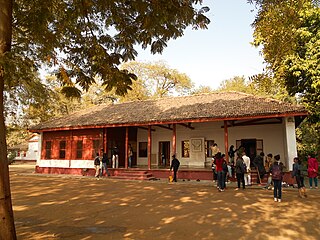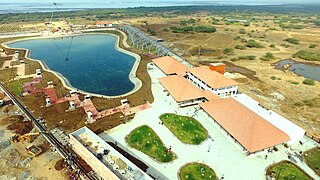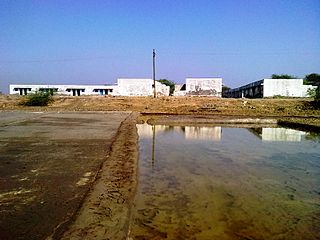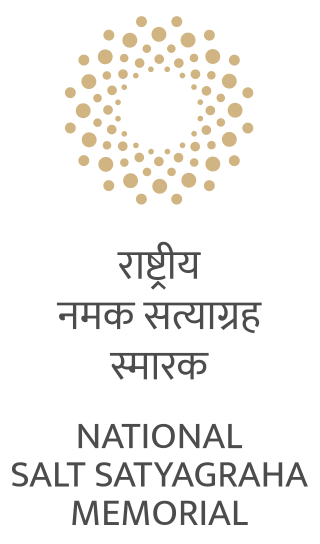
The Salt march, also known as the Salt Satyagraha, Dandi March, and the Dandi Satyagraha, was an act of nonviolent civil disobedience in colonial India, led by Mahatma Gandhi. The 24-day march lasted from 12 March 1930 to 6 April 1930 as a direct action campaign of tax resistance and nonviolent protest against the British salt monopoly. Another reason for this march was that the Civil Disobedience Movement needed a strong inauguration that would inspire more people to follow Gandhi's example. Gandhi started this march with 78 of his trusted volunteers. The march spanned 387 kilometres (240 mi), from Sabarmati Ashram to Dandi, which was called Navsari at that time. Growing numbers of Indians joined them along the way. When Gandhi broke the British Raj salt laws at 8:30 am on 6 April 1930, it sparked large-scale acts of civil disobedience against the salt laws by millions of Indians.

Sabarmati Ashram is located in the Sabarmati suburb of Ahmedabad, Gujarat, adjoining the Ashram Road, on the banks of the River Sabarmati, 4 miles (6.4 km) from the town hall. This was one of the many residences of Mahatma Gandhi who lived at Sabarmati (Gujarat) and Sevagram when he was not travelling across India or in prison. He lived in Sabarmati or Wardha for a total of twelve years with his wife Kasturba Gandhi and followers, including Vinoba Bhave. The Bhagavad Gita was recited here daily as part of the Ashram schedule.

Dandi is a village in the Jalalpore taluka, Navsari District, Gujarat, India. It is located on the coast of the Arabian Sea near the city of Navsari.

Navsari is an administrative district in the state of Gujarat in India, with its headquarters at the city of Navsari. The district covers an area of 2,211 square kilometres and was formed in 1997 after Valsad district was split into Valsad and Navsari districts. It is the largest producer of chikoos in India.

Abbas Tyabji was an Indian freedom fighter from Gujarat, and an associate of Mahatma Gandhi. He also served as the Chief Justice of Baroda State. His grandson is historian Irfan Habib.
Navsari is the ninth biggest city in the state of Gujarat in India. It is the administrative headquarters of Navsari District. Navsari is between Surat and Mumbai. It is a twin city of Surat, 37 km to the north. At the 2011 Census of India, Navsari was the 16th biggest city of Gujarat state. It ranked 10th most populous city of Gujarat in the 1991 Census of India and 2001 Census of India. Dandi village near Navsari was the focal point of the great Salt March led by Mahatma Gandhi during civil disobedience movement of India.

Dharasana Satyagraha was a protest against the British salt tax in colonial India in May 1930. Following the conclusion of the Salt March to Dandi, Mahatma Gandhi chose a non-violent raid of the Dharasana Salt Works in Gujarat as the next protest against British rule. Hundreds of satyagrahis were beaten by soldiers under British command at Dharasana. The ensuing publicity attracted world attention to the Indian independence movement and brought into question the legitimacy of British rule in India. The legitimacy of the Raj was never re-established for the majority of Indians and an ever increasing number of British subjects. Along with international attention, the Indian Independence Movement continued to spring into widespread support among the Indian population, with general disdain of the colonial government due to the violent antics of British officials at Dharasana.
Sachin is area and Surat Municipal corporation in the Surat Metropolitan Region in the Indian state of Gujarat. The town has a large industrial area managed by Gujarat Industrial Development Corporation (GIDC), SurSEZ, Diamond SEZ and many other private SEZs, In Land Container Depot (ICD) is located in Sachin.
Taxation of salt has occurred in India since the earliest times. However, this tax was greatly increased when the British East India Company began to establish its rule over provinces in India. In 1835, special taxes were imposed on Indian salt to facilitate its import. This paid huge dividends for the traders of the British East India Company. When the Crown took over the administration of India from the Company in 1858, the taxes were not replaced.

South Gujarat, also known as Dakshin Gujarat, is a region in the Indian state of Gujarat. The region has a wetter climate than other regions of Gujarat. The western part is almost coastal and is known as Kantha Vistar, and the eastern part is also known as Dungar Vistar, which ranges from 100 to 1000 metres, with the highest peak at Saputara in the Dang district.

Gujarat is a state in Western India. It has the India's Longest Coastline of 1214 km and It also has the one of the Largest Salt Desert in the World with the Area of 7500 Sq. km.

Dharasana is a town in Valsad, Gujarat, India, adjacent to Dandi. It shot to worldwide fame in May, 1930 as the site of the Dharasana Satyagraha, an immediate follow up to the Dandi salt march.
Kapletha is a village in Surat district in Gujarat, India. Situated approximately 21 kilometres (13 mi) south of Surat, the village population is approximately 2500. It has a very large Islamic university known as Jamiatul Qirat. Also, there is the river Mindhora which flows from the outer side of village. There are many brick factories around the village. Most of the villagers are in abroad mainly in the United Kingdom, the United States, Canada, South Africa, New Zealand, and Barbados Panama. The villagers' main occupation is farming. There is a small pond in the heart of village and also there is a restaurant named Sigdi on main Surat-Navsari road in Kapletha. Mahatma Gandhi, during his Dandi march journey, visited this village and crossed the river Mindhora. During that period there was no bridge over the river, so the villagers made a bridge with bullock cart and Mahatma Gandhi crossed the river and continued his journey towards Dandi. In this village, most people have Patel as their last name, also there are DEGIA, Aswat, Pandor, Chichwadiya, Sacha, Harpati, Dhimmar, Raja, Ukadia etc.

Mahatma Mandir is a convention and exhibition centre located at sector 13 C in Gandhinagar, Gujarat, India. It is inspired by the life and philosophy of Mahatma Gandhi. It is one of the biggest convention centres in India, spread over an area of 34 acres. It was developed by the Government of Gujarat. Business summits like Vibrant Gujarat Global Investor Summit 2011, 2013, 2015, 2017 and 2019 were organised here.

Gyarah Murti is a monument located in New Delhi, India, commemorating the country's struggle for independence under the leadership of Mahatma Gandhi. Devi Prasad Roy Choudhury is credited as its sculptor. An ensemble of eleven statues, ten represent people from diverse sociocultural, religious and economic backgrounds following Gandhi in the lead. Widely believed to depict the Dandi March, the statue has been replicated in other cities in India and was featured on the old 500-rupee currency note.

Mithuben Hormusji Petit was one of the pioneer Indian independence female activists who participated in Mahatma Gandhi's Dandi March. She became a recipient of India’s fourth highest-civilian honour, Padma Shri in 1961, for her social work.

The National Salt Satyagraha Memorial or Dandi Memorial is a memorial in Dandi, Gujarat, India, that honors the activists and participants of the Salt Satyagraha, an act of nonviolent civil disobedience in colonial India which was led by Mahatma Gandhi in 1930. The memorial is spread over a 15 acres (61,000 m2) and is located in the coastal town of Dandi, where the Salt March ended on 5 April 1930 and the British salt monopoly was broken by producing salt by boiling sea water. The project was developed at an estimated cost of ₹89 crore (US$11 million).

Sadashiv Sathe or Bhau Sathe was an Indian sculptor. His notable works include the 5-metre high statue of Mahatma Gandhi that is part of the main structure of the National Salt Satyagraha Memorial situated at Dandi, Navsari and the 18-foot equestrian statue of Shivaji at the Gateway of India, Mumbai.
Gandhi Smriti railway station is a small railway station on the Western Railway network in the state of Gujarat, India. Gandhi Smriti railway station is 3 km away from Navsari railway station. Passenger and MEMU trains halt here.















